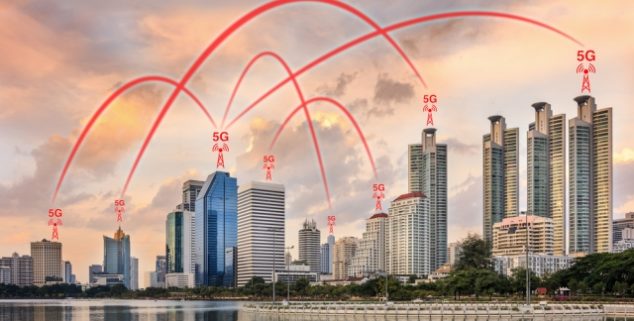Opinion
Smart cities will move right along with 5G
 An illustration of the urban connectivity of a 5G-based wireless system. (Image: Supparsom, via Shutterstock)
An illustration of the urban connectivity of a 5G-based wireless system. (Image: Supparsom, via Shutterstock)“Smart cities” refers to the concept of using technology to bring together physical aspects of cities, from cars and street lights to the buildings and residents, and integrating them through data, analytics, and communication. It has become such a significant topic that it will be a centerpiece of next year’s world-renowned Consumer Electronics Show (CES).
Smart cities will soon take a major leap forward — thanks to a groundbreaking technology, 5G, or the 5th generation wireless network.
California has a long history of embracing advanced technologies to make cities safer, greener, and more prosperous.
5G is anticipated to be 100 times faster than the current 4G network, which many of our devices utilize today, and 5G will dramatically reduce the time it takes to share information.
Implementing the 5G network will require the deployment of thousands of small, discreet wireless antennas, known as small cells, in cities. While California has already achieved near ubiquitous wireless broadband, this new infrastructure will usher in unprecedented levels of wireless speed, coverage, and network capabilities.
To advance the deployment of small cell technologies, Senate Bill 649, is making its way through the state Capitol. Buoyed with the overwhelming support from policymakers, technology leaders, and the community stakeholders, this legislation simplifies the often time-consuming local permitting process for small cells.
It also prevents excessive fees, which can delay technology deployment in our cities.
California has a long history of embracing advanced technologies to make cities safer, greener, and more prosperous. It’s the reason California has more tech workers, over 1.1 million, than any other state, with growth of 48,600 net new tech jobs year-over-year. SB 649 is another example of that forward-looking leadership in action.
As California leaders, businesses and the tech community continue to implement smart cities initiatives, we must recognize that our cities are on the verge of incredible transformations.
This next generation network will better enable technologies such as traffic sensors, smart grids and autonomous vehicles. And the energy and environmental benefits are critically important, as cities currently account for 60 – 80 percent of global energy consumption and 75 percent of carbon emissions.
The 5G network, supported by small cells, could spark innovations, productivity, new investment, and industries we have yet to imagine. Local governments are likely to see increased revenue from economic activity. One study even predicts, “California could see as many as 375,000 long-term jobs created,” as the result of deploying the 5G wireless network.
This digital infrastructure additionally creates an ecosystem for new technologies to come online. The smarthophone revolutionized our society, creating new ways to communicate, sparking the “app economy” with attendant innovations like ride sharing, mobile banking, mobile TV/video streaming, and countless other types of applications. However the success of smartphones was only possible because of an advanced digital wireless network.
Next generation wireless infrastructure is necessary to deliver the future, transforming our cities and improving the way consumers all live, work and play.
—
Ed’s Note: Gordon Feller co-founded Meeting of the Minds, a global thought leadership network and knowledge-sharing platform focused on the future of sustainable cities, innovation and technology. From 2010-2016, Feller was the Director of Urban Innovation at Cisco Systems headquarters in Silicon Valley.
Want to see more stories like this? Sign up for The Roundup, the free daily newsletter about California politics from the editors of Capitol Weekly. Stay up to date on the news you need to know.
Sign up below, then look for a confirmation email in your inbox.

Thank you Feller.